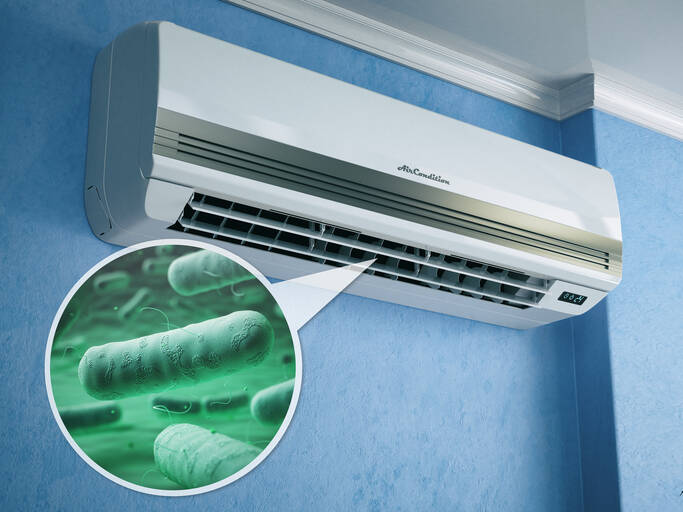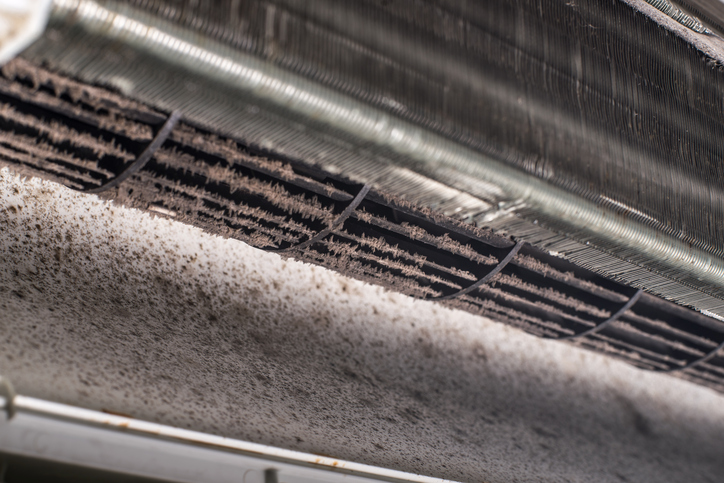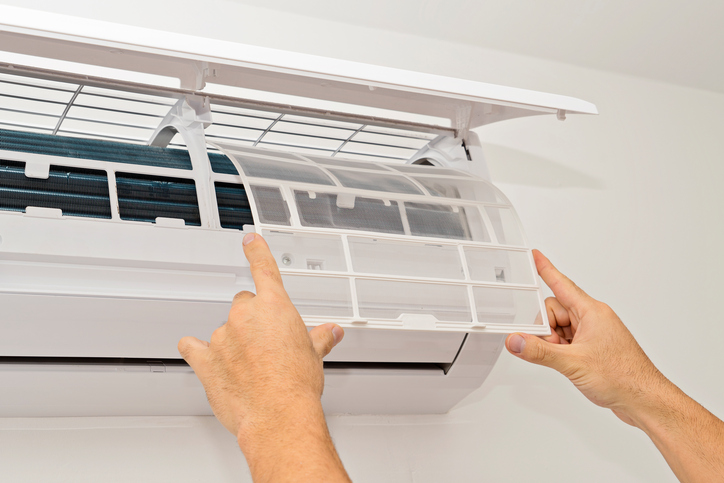- uvzsr.sk - article on the website of the Public Health Office of the Slovak Republic
- webnoviny.sk - article about the harmful effects of air conditioning
- doctor.ndtv.com - 8 Side Effects of AC (Air Conditioner): We Should Watch Out For
- pubmed.ncbi.nlm.nih.gov - Risk factors in heating, ventilating, and air-conditioning systems for occupant symptoms in US office buildings: the US EPA BASE study
- cdc.gov - Chapter 12: Heating, Air Conditioning, and Ventilation
How does air conditioning affect our health? + Diseases and side effects

Air conditioning is designed to increase comfort at work, at home or during travel. When used improperly and neglected, it has a negative impact on health. It is a cause of respiratory, musculoskeletal and excretory diseases.
Article content
You ask:
What side effects are associated with the use of air conditioning?
Have you experienced problems such as stiffness, muscle, joint, cervical spine, shoulder or head pain at the exact time of use?
In addition, the dried mucous membrane of the respiratory tract is a gateway for pathogens. Colds, sniffles, coughs and upper respiratory tract inflammation are only a small part.
During hot days, using air conditioning is perfectly natural. One tries to increase comfort at work, at home or while traveling. In the heat, we find it hard to think, concentrate and produce.
However, when used improperly and neglected, air conditioning can cause a variety of health problems. We know what causes air conditioning.
What is air conditioning and what is it for?
Air conditioning is used to modify the air and the environment we are in. Primarily, we use it to lower the temperature. In addition to this, it also changes other properties of the air.
Air conditioning modifies air properties such as:
- temperature, cooling or heating
- humidity, dehumidifies
- cleanliness, filters for example pollen, dust
- it also affects air distribution, airflow
We use it mainly as a tool to cool the environment. In addition, air conditioning can also heat. So it can be used as a quick heat source in cold weather.
Whether it is an air conditioner in a family house, in shopping centres or in a car, the principle is the same. Air is drawn into the air conditioner, then cooled or heated and transferred back to the environment.
Every air conditioner dries the air, dehumidifies it. There are some that can humidify it, and the more equipped ones can ventilate the room. If it is equipped with a filter, it also cleans the air.
Dry air dries out the mucous membranes of the nose and mouth. This adversely affects the protection from the outside environment and therefore dust or micro-organisms.
So far, air conditioning can be described as a beneficial process that improves comfort and purifies the air. However, this is not the case from the first time it is run until forever.
What health problems does air conditioning cause?
Not only the small air conditioners in our homes or workplaces, but also the large air conditioners in malls and centrally ventilated buildings require regular maintenance. Otherwise, there are significant health risks when they are used.
Various aches and pains or colds from air conditioning have been known to occur. It is important to protect yourself and take proper care of the equipment.
Maintain the hygiene standard, cleanliness of the HVAC system
Health is paramount. Hygiene standards should therefore not be neglected. At home or in our car, we are responsible for cleaning and maintaining the equipment ourselves.

Let's take a look together at all the summer problems:
Our health in summer - sun, heat, injuries and illnesses
This is also the case for air conditioning in public buildings, workplaces and large centres. There, the building manager or other authorised person or company is responsible.
Negative effects on the body
We can feel whether air conditioning has a negative effect in the first place.
The air smells unpleasant and is literally heavy. Dust stirs up in the room when it starts up. This gets into our airways, where it irritates us to sneeze or cough. Our eyes could also have their say.
A person working in an air-conditioned environment for a long time is up to 2.5 times more susceptible to respiratory diseases.
This dust can be a source of micro-organisms and therefore disease. Pathogens settle and multiply where dust and moisture build up.
In such conditions, microorganisms such as:
- bacteria
- moulds
- yeasts
These micro-organisms only circulate in the air for a limited period of time. They then settle and re-enter the air by re-circulation.
How negatively they will act depends on several factors such as the species, number, size of the pathogens. The location that supports their occurrence and multiplication is important. The subsequent dispersal time in the air is also important.
Different pathogens enter the air in different forms:
- part of droplets, such as droplet infections
- isolated particles, in the form of spores, such as moulds
- bound to various parts of dust, soil, plant parts, in skin scales, in hair, from animal hair and feathers
Features of the room that are conducive to the occurrence of pathogens:
- high humidity in the building masonry
- poorly ventilated room
- dirty and unmaintained room
In addition, the operation of the HVAC system can directly support the presence and proliferation of microorganisms. Moisture and water droplets protect pathogens from drying out and carry them as aerosols.
Care should also be taken when using humidifiers.
However, internal factors are also important for the outbreak of problems.
Internal factors that influence the outbreak include:
- individual susceptibility
- the state of immunity
- current state of health
- long-term illness, particularly cardiovascular disease
- medications taken, whether long-term or short-term
- nutritional status
- exercise regime
In addition to the microorganisms themselves, the improper and inappropriate use of air conditioning also comes to the fore. A sudden change in temperature, as in the case of moving from a warm to a cold room and vice versa, also has a negative effect on our bodies.
The thermoregulatory mechanisms work differently in young children and in the elderly. The same is true if a person has a cardiovascular disease. In these cases, it is advisable to use air conditioning very carefully.
Too warm and hot an environment can exhaust the body of a child and the elderly. The principles of proper use of air conditioning should still be kept in mind.
Most often, improper use of air conditioning affects the respiratory system, the musculoskeletal system and the skin.
Examples of problems are:
- runny nose, stuffy nose and runny nose
- cough, which can be dry but also productive with expectoration of mucus
- sensitive and dry sinuses and nose
- pain in the head, neck, neck, shoulders, joints
- dry eyes
- dry skin
- fatigue
- feeling sick
Of course, in some cases, a visit to the pharmacy is sufficient. However, if the problems worsen and more serious symptoms develop, it is necessary to see a doctor.
Examples are inflammation of the lower respiratory tract - bronchitis to pneumonia.
You should definitely seek medical treatment if the symptoms worsen. Examples include:
- fever, i.e. body temperature rising above 38 °C
- shivering, chills
- lack of appetite and nausea to a feeling of vomiting
- fatigue and weakness
- headache and body aches
- shortness of breath, feeling of difficulty breathing
- rapid breathing
- cough, dry, choking or productive
- chest pain aggravated by breathing - burning behind the breastbone when breathing in and coughing
Want to prevent health problems?
Learn to use it correctly:
Using air conditioning correctly without harmful effects
Diseases and health problems related to air conditioning are listed in the table below
| Health problems | Description |
| Respiratory problems |
|
| Sick building syndrome | Sick Building Syndrome - SBS
The syndrome has a variety of manifestations, including:
|
| Other chronic problems | association with inappropriate and incorrect use of air conditioning |
Effect on the musculoskeletal system, especially with poor airflow settings, directly on the body, face
| |
| dry eye syndrome | |
| inflammation of the eyes and conjunctiva | |
| headache | |
| tooth and facial pain due to nerve inflammation | |
skin changes such as:
| |
| |
| allergy to cold | |
| fatigue and exhaustion | |
| concentration disorders | |
Interesting information:
What to think of as sore throat
As mentioned, the main risk groups include children, especially young children, and the elderly. However, people with weakened immunity, smokers and alcoholics are also at risk. Similarly, people recovering from an illness are also at risk.
Air conditioning and children + people with weakened immunity
Dried mucous membranes from the cool, dry air of an air conditioner are not suitable for young children.
Have you come from the maternity ward and have a newborn or young baby at home?
Remember that small babies do not have well-developed immunity in the first weeks to months. And therefore, they are more susceptible to viral or bacterial diseases.
But even with larger babies, it is not advisable if the temperature difference exceeds 6 °C.
Of course, it is completely inappropriate to blow cold air directly on the body - whether of an adult or a child.
The same is true if the person is susceptible to illness because of a weakened immunity.
In large shopping malls, central air conditioning is used to regulate the air temperature. Places with a higher concentration of people and with this type of air conditioning are not very suitable for walking with babies and small children, but rather unsuitable.
How to deal with high temperatures?
It is necessary to follow a few guidelines that apply to both children and adults:
- Clothing should be appropriate, loose fitting and made of lightweight natural materials.
- do not dress yourself or your children in tight and artificial clothing
- shower with lukewarm water and wipe the body with a damp towel
- changing sweaty clothing regularly
- check body temperature in young children, as young children do not have a fully developed thermoregulatory centre
- sufficient drinking and adequate fluid intake
- breastfeed infants more often, smaller but more regular doses may be necessary
- darken and shade the room where you are staying and where the baby sleeps
- spread damp towels in the dry air area
- ventilate especially in the morning, when the outside air has not yet warmed up, and in the evening, when the sun is not so hot
Even when using air conditioning, it is important to ventilate...
Even several times a day.
If you don't have an air conditioner with a ventilation function, remember that the air conditioner doesn't ventilate. It only adjusts the air temperature.
So not only in the morning and evening, but also during the day, the air-conditioned space must be ventilated.
By ventilating the air, you will to a certain extent get rid of dirt and microorganisms and balance the humidity.
Don't forget:
Ventilate for 10-15 minutes in the morning and evening.
Open all windows, not just the vents.
This ensures sufficient air exchange in the home and indoors.
Don't forget about maintenance.
An important part of running an air conditioner, regardless of type, is regular and consistent maintenance. Cleaning refers to gross soiling, but also to disinfection. In some cases, the condensate drain is blocked.
Water then accumulates in the clogged drain pipe. Water and moisture is a source for the multiplication of various pathogens. Various mycoplasmas and chlamydia are also dangerous.
The filters need to be changed or the particulate filter needs to be cleaned of dust. At least twice a day, the air-conditioned space needs to be ventilated by opening the windows. Early morning and evening are best.

Air conditioning maintenance should be carried out:
It is best to maintain the air conditioner at least twice a year - before the first start-up and at the end of the season.
The filters should also be cleaned during operation.
We can do it ourselves.
Of course, it is best to have the cleaning carried out by an expert. He guarantees a professional service.
Vedľajšie účinky klimatizovania
Interesting resources










